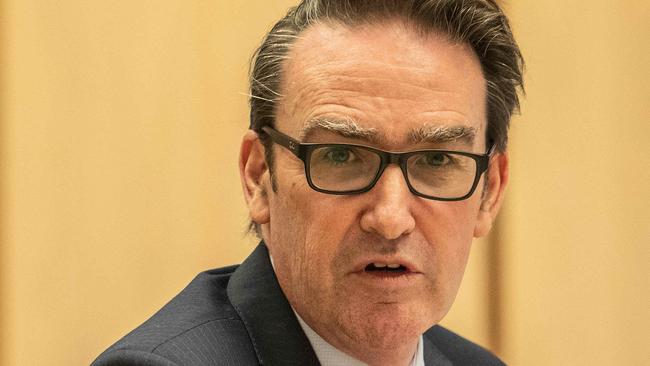Coronavirus: Victoria’s worsening outbreak undermines Treasury’s rosy assumptions, and its forecasts
Treasury secretary Steven Kennedy says the worsening COVID-19 outbreak in Victoria means the nation’s economic recovery will be worse than predicted.

Victoria’s worsening COVID-19 outbreak will significantly extend the nation’s financial slump, with the state’s devastating rates of infection prompting Treasury to issue fresh forecasts of soaring unemployment and sluggish economic growth.
Treasury secretary Steven Kennedy said the revised outlook for Australia’s economy was more dire than forecast in last week’s budget update due to the burgeoning crisis in Victoria, and warned more than three-quarters of firms there are expected to remain on JobKeeper beyond September.
Dr Kennedy told a Senate committee hearing on Thursday the explosion of cases in Victoria meant the estimates contained in last week’s update were already out of date, and said success in suppressing the second wave of infections “will matter enormously” for the nation’s economic prospects in coming months.
In its latest set of forecasts, Treasury predicted unemployment to peak at 9.25 per cent by December. But as Victoria reported a record 723 new coronavirus cases on Thursday, and Queensland prepared to close its borders to Sydney on Saturday, Dr Kennedy warned “growth will be lower, employment will be lower, and unemployment will be higher”.
The department’s forecasts, issued last week, were based on a best-case scenario that Melbourne’s lockdown would not be extended beyond six weeks, that other states and territories would not be forced to delay their planned easing of restrictions, and that the border between NSW and its southern neighbour would reopen by mid-August.
However, Dr Kennedy said the situation in Victoria had worsened since those forecasts were given to the government earlier this month. “Even since we put this update to government, things have deteriorated in a major state,” he said.
Scott Morrison also warned on Thursday that halfway through a six-week lockdown in Melbourne, “we are not getting the results we would hope for”.
The Prime Minister acknowledged that “further measures” to contain the spread of the virus “will come with an impact to the economy — we understand that”.
“But, equally, not containing these outbreaks will have that effect also,” he said.
Australian Bureau of Statistics payroll data this week showed Australia’s post-COVID jobs recovery went backwards in July, led by Victoria.
With no sign of a slowing in new infections, Dr Kennedy urged the Morrison government to be as flexible as possible when finalising the eligibility rules around which firms would remain on the tapered wage subsidy scheme, known as JobKeeper 2.0.
“Had the Victorian circumstance not emerged we would have expected far fewer firms in Victoria to flow through to the second JobKeeper because of the reapplication of the eligibility test,” he said.
“In our latest estimates we now think at least 75 per cent of Victorian firms will stay on JobKeeper because of the circumstances they find themselves in compared to other states. The rules are yet to be made for the full application of JobKeeper (2.0), and as the government makes those rules it has to keep that (the deteriorating situation in Victoria) in mind.”
Dr Kennedy’s warnings came as the ABS reported that one in 10 firms receiving government support measures would close their doors if that support were taken away.
The ABS’s latest survey on the impact of the health crisis on businesses also showed that of those receiving support, 16 per cent would cancel investment plans if those measures were removed, 14 per cent would order less, and 13 per cent would cut staff.
Appearing before the same committee, taxation office officials said $18bn of an expected $32bn had been paid out to 750,000 small and medium-sized firms under the Boosting Cashflow for Employers measure.
The program provides eligible businesses with between $20,000 and $100,000, split evenly between the June and September quarters.
The ABS survey revealed more than half of surveyed firms had received the cashflow boost. Of those, over 60 per cent used the money to support employees, 56 per cent paid fixed costs, a third used the cash to meet debt obligations, and nearly 30 per cent added to their savings.
The survey of almost 1000 firms between July 15-23 also revealed that almost half reported a drop in revenue over the previous month.
Looking ahead, 27 per cent expected revenue to fall again in the month ahead, while 49 per cent predicted turnover to remain the same.




To join the conversation, please log in. Don't have an account? Register
Join the conversation, you are commenting as Logout